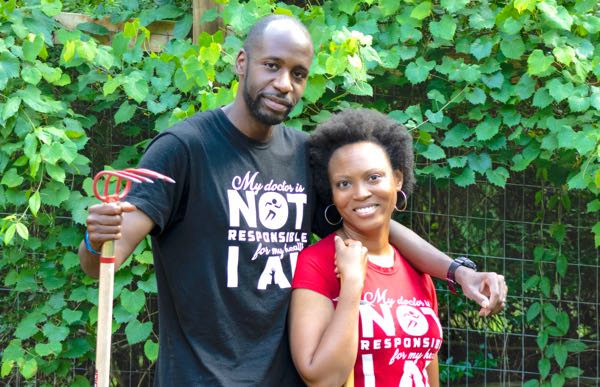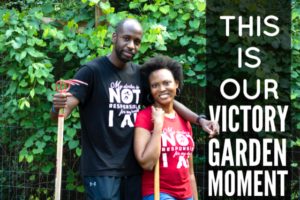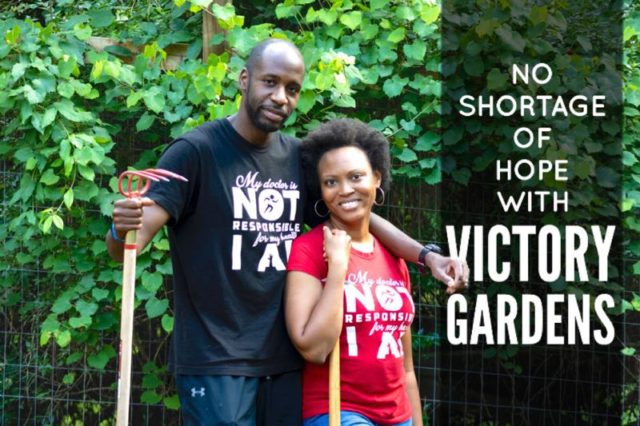 Mobile users tap and hold picture to share this story.
Mobile users tap and hold picture to share this story.
By Shawn McClendon, owner of Back to Basics Health and Wholeness LLC
Photos by Jojo Ward
As I step outside my house this morning, I anticipate seeing the changes that have occurred in my garden since I last tended to it yesterday. First stop is the patio, where my family and I have started a variety of vegetables from seed, including corn, tomatoes and watermelon. After that, I take a cursory glance at the potted herbs in the front yard, making sure that the soil is still moist. Finally, I turn my attention to the main garden in the backyard. Sure enough, new okra sprouts have emerged. Our okra harvest this year is guaranteed to be huge.
This is a picture of what my family and I are doing in our vegetable garden this year. 2020 marks ten years that my wife and I have gardened together, and this year’s garden is, hands down, our biggest and most ambitious yet. Yes, part of the reason is because we highly value fresh vegetables in our diets. Healthy living is one of our family values, as well as the motivation behind the health and fitness business I started years ago. We are also motivated by the educational and exercise opportunities that gardening presents. However, this year (a year when hope seems to be in short supply), a new factor has encouraged us to invest more heavily in our garden.
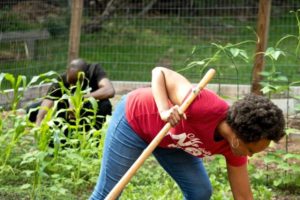
THE VICTORY GARDEN MODEL
The Coronavirus pandemic has, in fact, been our biggest motivation for taking our gardening to the next level. Some of the challenges brought on by COVID-19 – social distancing, grocery store shortages, boredom and the like – have propelled us to take procuring our family’s food into our own hands. However, it doesn’t stop there. We have also been inspired by the current state of affairs to encourage others to grow their own food, modeling after the “Victory Garden” tradition from many years ago. In fact, we have dubbed this season, “Our Victory Garden Moment.”
During World War I, many countries in Europe experienced significant food shortages after many farm workers enlisted in the military and farmland became battlefields. In 1917, the National War Garden Commission was established to ensure the integrity of the food supply of the United States. The purpose of the commission was to encourage American civilians to do their part by growing and saving as much of their own food as possible. From propaganda posters, to “how-to” pamphlets with planting and canning instructions, the government issued an effective “call-to-arms” to the general population to grow these gardens, initially called “War Gardens,” then later referred to as “Victory Gardens.”
Listen to Shawn’s podcast:
Isn’t that amazing? I continue to find this history fascinating, not only because of the sheer magnitude of what regular citizens were able to accomplish, but also because during a time of crisis and challenge, millions of individuals rolled up their sleeves and contributed by growing their own food. This is why my family sees the current public health crisis as our Victory Garden moment. In the face of food shortages caused indirectly by the pandemic, as well as the needs of those on the front lines – healthcare workers, policemen, grocery store workers and more – we feel that by taking our garden more seriously, we are doing our part.
OUR FAMILY’S VICTORY GARDEN
Let me tell you a bit more about our family’s Victory Garden. Our garden, like many people’s home garden, is within a backyard. In addition to vegetables we also grow herbs such as rosemary, thyme and mint in our front yard in pots. Our vegetables this year include corn, tomatoes, okra, squash (zucchini and yellow crookneck), sweet potatoes, beans, peppers and chard. Most plants are being grown in raised beds, but we also have a large in-ground bed that we dug just this year.
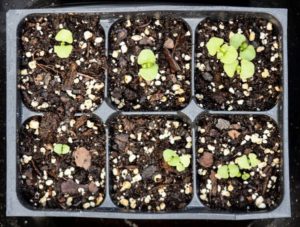
While we did purchase a few seedlings from our local gardening store, starting plants from seed has been very important to us this year. We have learned a lot from our past mistakes with seed starting, and have been much more successful in growing our own seedlings this year. Most of the seeds are organic, and all are non-GMO (genetically modified organism). We have used everything from seed-starting kits, to jiffy pots, to toilet paper rolls and old peanut butter jars as containers for starting our seeds. Everything is fair game with our garden this year.
We water the garden almost every day via a regular garden hose, and by using wood chips as mulch, we are able to retain some level of moisture in our soils which reduces the watering needs of our gardens to an extent. Here in middle Georgia, we also had our fair share of “April Showers,” so that has kept us from having to water as often. I always say that there’s no watering better than the watering that the Lord provides through the rain.
 Gardening has served as a wonderful mobilizing and bonding activity for our family. My oldest child, who is soon to be six, has taken up her own genuine interest in growing vegetables, and is always looking forward to our mid-morning gardening run. I call her my “second-in-command.” The baby, who is just over a year old, usually watches from her stroller or from the hip of a parent. While she doesn’t fully understand what we’re doing yet, she absolutely loves to be outdoors. My wife and I often take turns going outside so that we can uphold our career obligations, but we each are fully invested in our gardening. It is a blessing when you know that your spouse carries the vision as fully as you do.
Gardening has served as a wonderful mobilizing and bonding activity for our family. My oldest child, who is soon to be six, has taken up her own genuine interest in growing vegetables, and is always looking forward to our mid-morning gardening run. I call her my “second-in-command.” The baby, who is just over a year old, usually watches from her stroller or from the hip of a parent. While she doesn’t fully understand what we’re doing yet, she absolutely loves to be outdoors. My wife and I often take turns going outside so that we can uphold our career obligations, but we each are fully invested in our gardening. It is a blessing when you know that your spouse carries the vision as fully as you do.
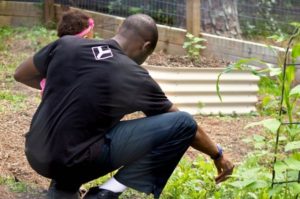
On a spiritual level, gardening to me constantly provides a fundamental illustration of the Kingdom of God. When, for example, I plant more squash seeds, I consider the many seeds contained in the core of a squash, each of which potentially represents a separate plant which will grow many more squash and seeds. I am thus reminded of how Philippians 4:19 says that God will “supply all [our] need according to His riches in glory by Christ Jesus.”
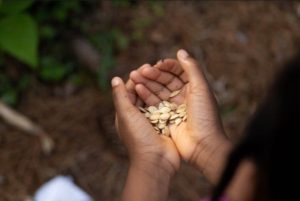
I am reminded of the power of God when I consider that a seed, which often looks like a mere crumb or crust, contains the mysterious and miraculous force of life within itself, which is activated when placed in soil. When I observe the various insects, which come into the garden, as well as how the mulches that lay on top of our garden beds gradually break down and nourish the soil, I think of the creation story and how God systematically created everything in our world, and how every single thing in it has a purpose.
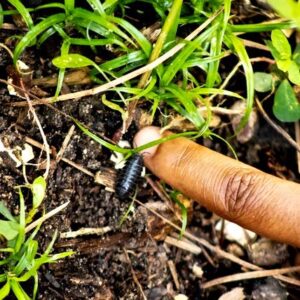
CATCH THE VISION AND GROW
There is no doubt that we live in an unprecedented time right now. There are very few, if any, people alive in the world that can remember life during the last worldwide pandemic in 1918. So, this is new for all of us. We are being comprehensively challenged – mentally, physically, spiritually, and financially, no matter who we are or where we live.
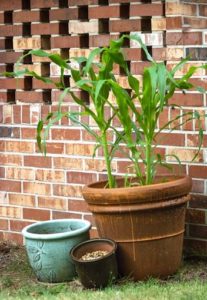
In the midst of your challenging times, remember there is no shortage of hope. I want you to catch the fire and catch the vision of growing your own Victory Garden – whether in your front yard, backyard, or in pots. Supply your family with fresh fruits and vegetables. I want you to visualize how gardening during times of crisis is a way to counter fear, as well as a way to create community and help others in need. I want you to know that the power to grow resides in your two hands, no matter how inexperienced you are, and no matter how much of a “brown thumb” you think you have.
Join me by growing your own Victory Garden. It’s not too late!
BE PART OF THIS CONVERSATION. POST YOUR FACEBOOK COMMENT BELOW.
Sources
Courtney, Erin. “Sowing the Seeds of Victory.” Architect of the Capitol, 15 Nov. 2017, www.aoc.gov/blog/sowing-seeds-victory.
Schumm, Laura. “America’s Patriotic Victory Gardens.” History, A&E Television Networks, 29 May 2014, www.history.com/news/americas-patriotic-victory-gardens.
